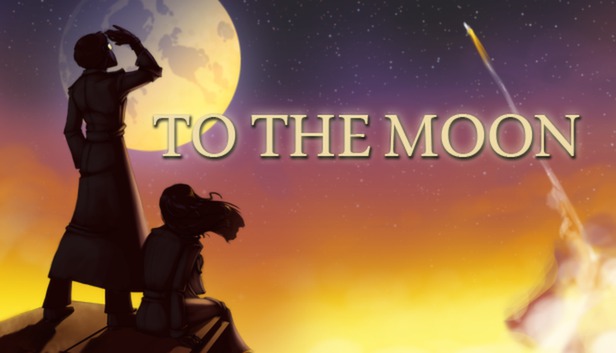Basically the title. To preface, To the Moon (Freebird Games, 2011) is a game made with RPG Maker that eschews the conventions associated with the engine, such as combat or inventory. In my opinion, the game is the epitome of a visual novel, with only basic mechanics to complement its utterly compelling narrative. As such, the elements of mechanical difficulty and interpretive difficulty are, I would say, almost nonexistent with regards to the core story; beyond solving simple puzzles, the player largely travels a linear path (in several ways), experiencing the scenes and writing through voiceless text boxes, for the most part.
This is probably the only game I know that I would hate to spoil for anyone else, so I will try to adjust my discussion accordingly and avoid plot details. Suffice to say, the story seems to be written deliberately to evoke feeling, emotion, and contemplation, with core themes being inspired by personal experiences of the lead game designer, Kan Gao. But, from what I gleaned from our class discussion, affect is a distinct concept, though it intersects with feeling and emotion. It seems to represent the pre-personal, subconscious, or unconscious response to stimuli, with its “difficulty” lying in its uncontrollability, in its inexplicability. A horror game might induce an involuntary affective response through a jump-scare. Additionally, it might be introducing difficulty in how it makes you resist playing the game, conditioning you subliminally to dread another scare and, perhaps, dread playing itself.
But fear is ostensibly an undesirable emotion or affect—so how would a psychological drama (but not horror) like To the Moon generate difficulty through some kind of comparable means? In my opinion, its soundtrack is the key. Sound in general seems like suitable vehicle for affect, with hearing being a sense that embodies visceral, instinctive reactions to something external. Oftentimes, when you like a song or genre of music, you can’t say precisely why you like it. The deliberate proclivities of the individual don’t matter so much as the subconscious preferences or responses to the imprecise, vaguely categorizable information that sound represents.
In To the Moon, the environmental storytelling is largely visual (and is so mostly in the 16-bit style of RPG-Maker); the player reads dialogue and object descriptions with no voiceover, at times observing more detailed art of certain objects. Other than the odd sound-effect, audio is limited to the composed instrumental music (with one exception), which backdrops almost every scene. There isn’t quite the level of auditory immersion as there is in Triple A RPGs. But every single piece is tailored to fit each scene and the intended effect and affect—moments of melancholy, of course, but also moments of jubilation, of turbulence, or of comedy. The music contextualizes the dialogue, provides unspoken voice and inflection to each line. I would say that the audio experience is not just supplementary or complementary to the game but represents as much of the game as the playable, visual component, if not more.
Moreover, in addition to standalone tracks, the game uses different versions of the same song, altered to convey a distinct mood; there is definitely a main theme, but the iterations ensure that there is something new to induce that “caught off-guard” moment (like a jump-scare, but just sound, and not jumpy or scary). Another creative design choice is to have certain pieces also be diegetic in nature, with the player both hearing what the characters are hearing or playing while understanding its significance in the overall plot. The composition of the piece sparks the immediate emotional, affective response of the player, and the story itself fuels its lasting thematic significance and impact. The song then provides lasting significance and impact to the story with its iterations as well as by the memorable nature of song itself.
Coupled with the storyline, the soundtrack created a gameplay experience that I remember and am affected by even years later. Therein lies the difficulty, I suppose—not during the playthrough itself, but in getting over the game and its message.
Although I have tried to answer a question for myself through the lens of affect, I’m not sure if I succeeded or not, or if my discussion was even coherent. Either way, I wholeheartedly recommend playing or watching a playthrough of this game to experience it for yourself.


When I saw a discussion post on To the Moon, I knew I had to read it. To the Moon has to be one of the most beautiful games I’ve ever played, and I will ALWAYS believe it needs more recognition. I completely agree with you about the power of its soundtrack; music is so important to a game, and especially this one and how it ties to the story.
I basically had the same reaction when I saw To the Moon in the title. This game was one of the best games I have ever played and I loved every bit of its story even though some people have criticized the gameplay to be a little lacking. I agree that the soundtrack of the game really adds on to the visual storytelling.
Freebird Games and Kan Gao (the people behind To the Moon – Kan is a narrative genius and he also composed all the music) also made two “sequels” to the game, Finding Paradise and Impostor Factory. It is so difficult to recommend them and express how great they are as games as stories without spoiling them, but they all center around the Sigmund Corporation, which operates a technology that alters one’s memories, and the procedure is performed on people on the verge of death who wish to have their memories altered in one way or another. Very, very powerful stories are told from this premise in these games and they all have beautiful soundtracks.